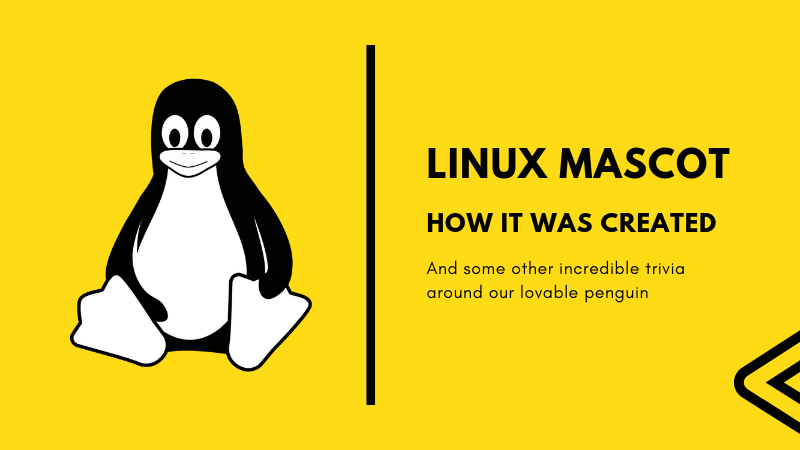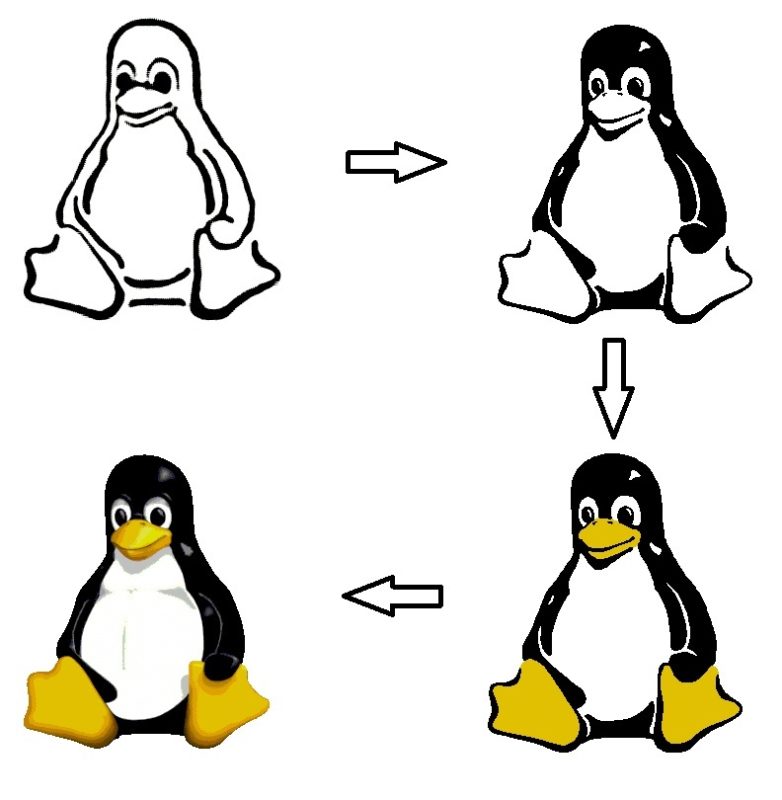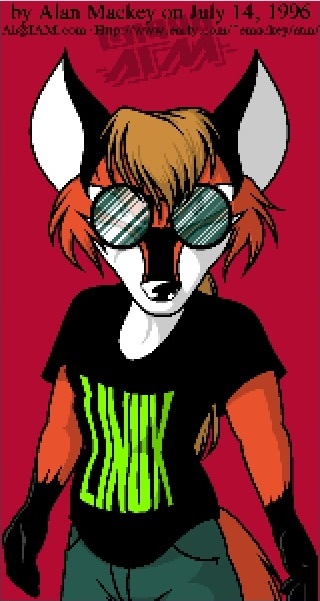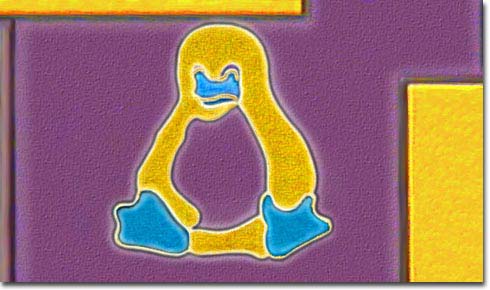We’ve all heard about our favorite Linux Mascot! In this Linux trivia series, I’ve scoured every nook and corner of the web I could reach out to, to dig up some old archives to gather some interesting trivia about our cute and friendly penguin, starting from its early days.

Chances are you might have already heard about its origins. But in this article exclusively dedicated to Tux, we are jotting down some interesting stories around the cute little fella with some info that might have gone unknown!
The first discussion about a mascot goes back to the early days of the Linux release, when Linus Torvalds shared his thoughts about choosing one that would gracefully be the torch-bearer of our beloved OS. That’s when many people dived in to contribute with their suggestions for the same.
The first email that cites the discussion of bringing in a Mascot goes back to 1996. It started with a hot debate about choosing creatures such as sharks or eagles which stopped the moment Linus mentioned that he was rather fond of penguins!
Re: Linux Logo prototype.
Linus Torvalds ([email protected])
Thu, 9 May 1996 17:48:56 +0300 (EET DST)
.
Somebody had a logo competition announcement, maybe people can send their ideas to a
.
Anyway, this one looks like the poor penguin is not really strong enough to hold up the world, and it’s going to get squashed. Not a good, positive logo, in that
.
Now, when you think about penguins, first take a deep calming breath, and then think “cuddly”. Take another breath, and think “cute”. Go back to “cuddly” for a while (and go on breathing), then think “contented”.
.
With me so far? Good
.
Now, with penguins, (cuddly such), “contented” means it has either just gotten laid, or it’s stuffed on herring. Take it from me, I’m an expert on penguins, those are really the only two options.
.
Now, working on that angle, we don’t really want to be associated with a randy penguin (well, we do, but it’s not politic, so we won’t), so we should be looking at the “stuffed to its brim with herring” angle here.
.
So when you think “penguin”, you should be imagining a
.
(*) Not FAT, but you should be able to see that it’s sitting down because it’s really too stuffed to stand up. Think “bean bag” here.
.
Now, if you have problems associating yourself with something that gets off by eating raw fish, think “chocolate” or something, but you get the idea.
.
Ok, so we should be thinking of a lovable, cuddly, stuffed penguin sitting down after having gorged itself on herring. Still with me?
.
NOW comes the hard part. With this image firmly etched on your eyeballs, you then scetch a
.
Then we can do a larger version with some more detail (maybe leaning against a globe of the world, but I don’t think we really want to give any “macho penguin” image here about Atlas or anything). That more detailed version can spank billy-boy to tears for all I
.
Linus
There have been numerous reports about the origins of Tux on various portals. I could have focused on just the origins but thought rather bring into light some other lesser known facts instead.
How was Tux first created?
Let’s start by discussing the tool with which Tux was designed. Yes, we have already covered it on It’s FOSS earlier. It’s GIMP!
Based on discussions on a linux-kernel mailing list about Tux and an initial suggestion by Alan Cox, Larry Ewing used GIMP 0.54 to create the first Tux image!
The majority of the drawing was done on a 486 DX2/50 running Linux with nothing but a mouse and GIMP. Since it was initially created on an 8-bit display, the final smoothing with GIMP was done on an SGI Crimson.
Larry drew the image as a black and white outline as we can see below in the first attempt which was later colorized in a series of steps:

One tool that he mentions in GIMP is Convolve, which proved quite helpful after the shape and primary shading had been done. He used it to carry out hand anti-aliasing, controlled smoothing, and a host of other neat effects on Tux. It aided in blurring the image with several different brush sizes to smooth out the shading. The air-brush extensively lightened or darkened areas that had smoothed a little too flat.
A complete description of Tux’s creation experience has been shared in his own words by Larry’s own page where he notes every detail of how Tux came to be as we know today.
We hope this also inspires you to create your own mascot if you think of one someday!
Recommended: The Earliest Linux Distros: Before Mainstream Distros Became So Popular
A Mascot Contender

These were some other contenders that couldn’t make it to the spot while competing with Tux. Apart from debating about eagles or sharks, there were also people who did not accept Tux as a mascot in the early days and preferred it to be a Fox instead. Seems like a sly pun! But it could not remain such a contender for long. The aura of Tux is too overpowering you know!
Linux Logo vs Mascot

Not a mascot but it was this logo for Linux 2.0 by Matt Ericson that could not replace Tux eventually in spite of winning a poll many years ago (1997). The logo got 785 votes whereas Tux got only 541. But look today! Tux is dominant everywhere! Tux is where Linux is!
The smallest known image of Tux!

A chip designer reported a miniature replica of Tux of about 130 microns in size (1 micron = 1 x 10−6 meters), with the Linux penguin nesting in the pad ring of an integrated circuit of unknown type and function. It was probably a special microprocessor that was optimized for its operating system.
The report that was briefly made about the same no longer exists on the internet. But thanks to the Way Back machine, you can still take a look!
When Tux went to Space!
This was definitely an incredible feat on January 18, 2011, by the Linux community in Australia with a noble fund-raiser goal at the Linux Conference at Brisbane, for the Queensland Premier’s flood relief charity. Despite the terrible flood, the Conference still happened undauntedly clearing all initial doubts about the same.
We’ve shared the photo with you before on our previous NASA article. A hard copy of the photo was signed by Vint Cerf (one of the “fathers” of the Internet), Eric Allman (of “sendmail” fame) and Linus Torvalds (the initiator of the Linux OS kernel). Tux and his photo were then auctioned at the conference dinner that followed, raising over $23,000AUD for the flood relief.
Project Horus, which made Tux a successful space tourist, was powered by Ham Radio, Linux, Open Source, and Open Hardware. Horus 14 – the high altitude balloon made it to space by reaching an altitude of 30-40km, about 3 times the altitude of a regular jet aircraft. The horizon was at a few 100 km, the black space-ish sky and the curvature of the Earth are quite visible. Air pressure was about 5% of the ground level and the temperature was -50 °C. The tracking beacon was powered by an Arduino micro.
This last one is undoubtedly my favorite Tux Trivia!
Hope you liked reading about all of these short but intriguing events in Tux’s history (You can refer to this hyperlink as a Tux Trivia Encyclopedia!).
If you have been part of any memorable event that relates with Tux, please share with us in the comments below and we’d be delighted to read them!

